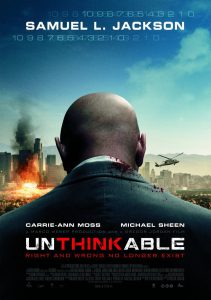 For the last 15 years, ever since the watershed events of 9/11, terrorism has become a central topic in the discussion surrounding security. The Bush administration’s decision to wage “war on terror” has spurred much debate about the sort of practices employed to counter this phenomenon. The consequences of the “war on terror” are visible in the attempts to reshape the international legal framework, however they equally weigh into the ethical, political and social domains, making terrorism an all-encompassing issue in the contemporary political landscape.
For the last 15 years, ever since the watershed events of 9/11, terrorism has become a central topic in the discussion surrounding security. The Bush administration’s decision to wage “war on terror” has spurred much debate about the sort of practices employed to counter this phenomenon. The consequences of the “war on terror” are visible in the attempts to reshape the international legal framework, however they equally weigh into the ethical, political and social domains, making terrorism an all-encompassing issue in the contemporary political landscape.
This crucial debate of our epoch had an obvious fallout on popular culture, especially TV shows, videogames and cinema. A theme that has become predominant in the cultural appreciation of the terrorism issue is the retrieval of information through the so called “enhanced interrogation”, or in a less nuanced way: torture.
Torture is a theme that appeared in many mainstream products since 2001 and it has hardly been approached in a critical manner. However, some rare products seek to problematize the idea of its effectiveness and go as far as suggesting ethical puzzles on how such a method is deployed in the fight against terrorism. One of these products is the 2011 movie “Unthinkable” never released in the theaters. Continuer la lecture

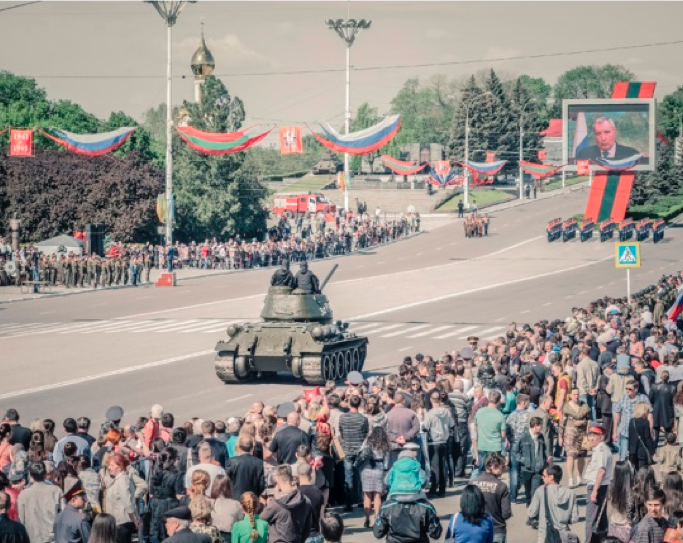


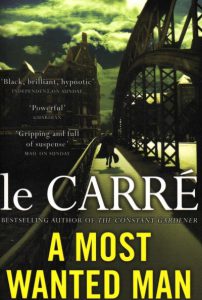 When Issa, a young Chechen, clandestinely disembarks in Hamburg on a boat coming from Sweden, he is a troubled man. On the verge of madness, he has been jailed and tortured in both Russia and Turkey where he has been convicted of terrorism for reasons unknown to the reader. Not surprisingly given that background, Issa isn’t exactly the trusting type. And, when at some point, he contacts a lawyer, Annabel Richter, he does so with one precise – albeit obscure – goal, to serve as an intermediary with Tommy Brue, an old-fashioned private banker indebted to his natural father. The reader doesn’t know much of Issa’s convoluted background. But neither do intelligence services for that matters. They nonetheless acquire an interest in him given his past association with terrorism, the fact that he is an “illegal” migrant, and their perception of him as an Islamist radical. Amongst them, is Günther Bachmann, from a special service within German intelligence services.
When Issa, a young Chechen, clandestinely disembarks in Hamburg on a boat coming from Sweden, he is a troubled man. On the verge of madness, he has been jailed and tortured in both Russia and Turkey where he has been convicted of terrorism for reasons unknown to the reader. Not surprisingly given that background, Issa isn’t exactly the trusting type. And, when at some point, he contacts a lawyer, Annabel Richter, he does so with one precise – albeit obscure – goal, to serve as an intermediary with Tommy Brue, an old-fashioned private banker indebted to his natural father. The reader doesn’t know much of Issa’s convoluted background. But neither do intelligence services for that matters. They nonetheless acquire an interest in him given his past association with terrorism, the fact that he is an “illegal” migrant, and their perception of him as an Islamist radical. Amongst them, is Günther Bachmann, from a special service within German intelligence services. 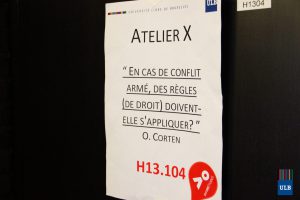 Le vendredi 19 février, l’ULB organisait sur le campus du Solbosch une après-midi de rencontre avec des élèves de dernière année du secondaire. A cette occasion, plusieurs membres du Centre ont participé à une activité reprenant le concept du Tribunal étudiant pour le règlement des différends internationaux (TERDI). L’atelier se composait d’un Président, de deux avocats plaideurs, et des étudiants de secondaire, dans le rôle de jurés.
Le vendredi 19 février, l’ULB organisait sur le campus du Solbosch une après-midi de rencontre avec des élèves de dernière année du secondaire. A cette occasion, plusieurs membres du Centre ont participé à une activité reprenant le concept du Tribunal étudiant pour le règlement des différends internationaux (TERDI). L’atelier se composait d’un Président, de deux avocats plaideurs, et des étudiants de secondaire, dans le rôle de jurés.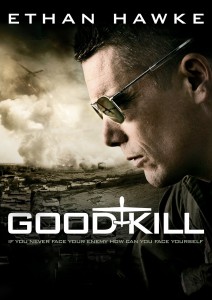 Le 4 mars dernier a eu lieu une séance de ciné-club organisée par le Centre de droit international ainsi que par Sciences Po Paris. L’idée était de croiser des analyses d’un juriste (Vaios Koutroulis, ULB), d’une politologue (Amélie Férey, Sciences Po Paris) et d’un militaire (Lieutenant Colonel De Cock). On les trouvera ci-dessous, ainsi qu’un bref compte-rendu du débat qui en a résulté. D’autres séances seront organisées ultérieurement sur le thème « guerre et cinéma ».
Le 4 mars dernier a eu lieu une séance de ciné-club organisée par le Centre de droit international ainsi que par Sciences Po Paris. L’idée était de croiser des analyses d’un juriste (Vaios Koutroulis, ULB), d’une politologue (Amélie Férey, Sciences Po Paris) et d’un militaire (Lieutenant Colonel De Cock). On les trouvera ci-dessous, ainsi qu’un bref compte-rendu du débat qui en a résulté. D’autres séances seront organisées ultérieurement sur le thème « guerre et cinéma ». 
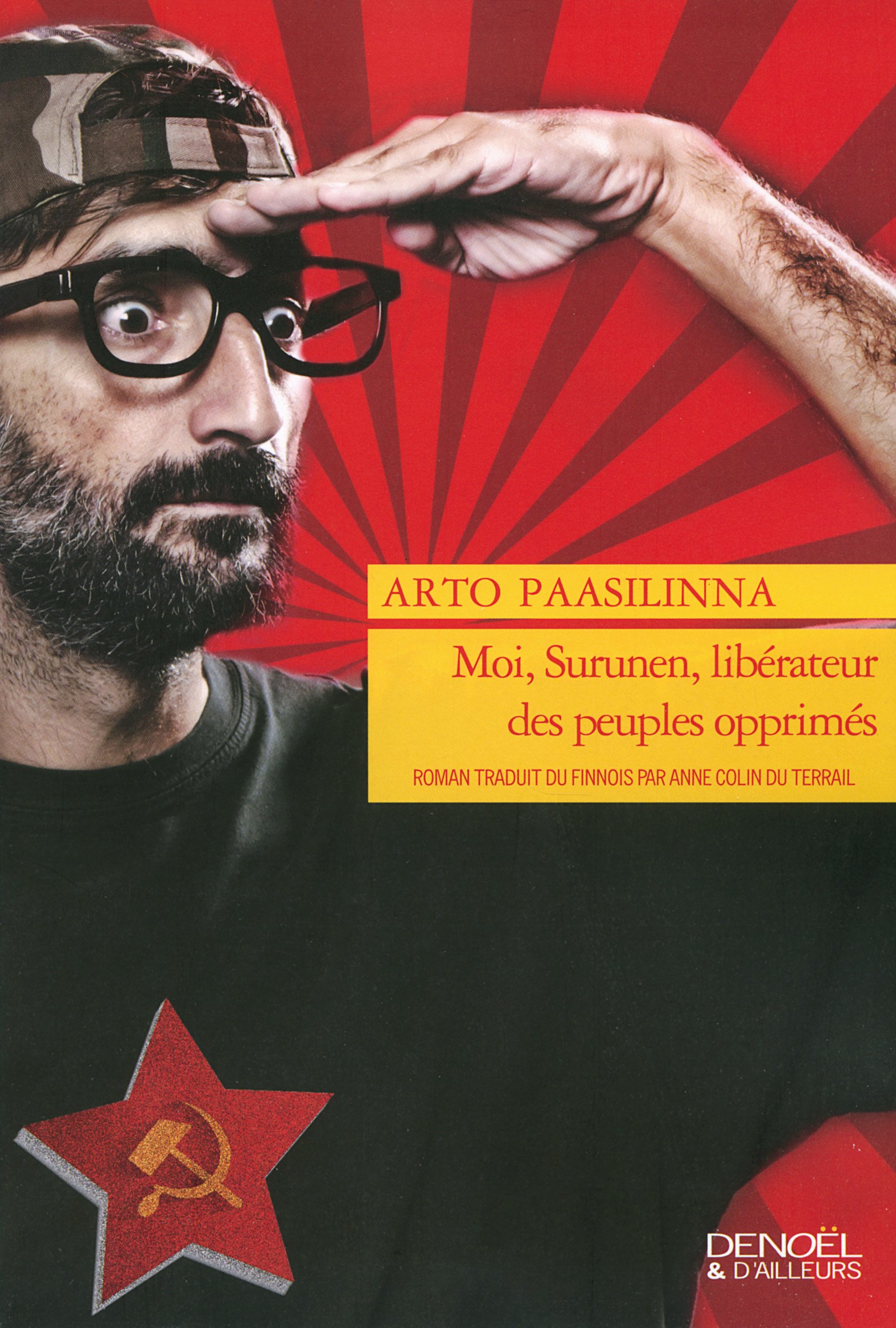 Né en 1942 dans un camion alors que sa famille fuyait les forces soviétiques alors en campagne dans son pays, Arto Paasilinna est un écrivain finlandais renommé, auteur de plusieurs de dizaines de romans dans lesquels il développe un humour fortement teinté d’absurde qui n’est, par moments, pas sans rappeler celui du romancier britannique Tom Sharpe. La réflexion à la fois désabusée et ironique sur le droit traverse plusieurs de ses œuvres, comme Prisonniers du paradis (1974), La Douce empoisonneuse (1988) ou encore Le Potager des malfaiteurs ayant échappé à la pendaison (1998).
Né en 1942 dans un camion alors que sa famille fuyait les forces soviétiques alors en campagne dans son pays, Arto Paasilinna est un écrivain finlandais renommé, auteur de plusieurs de dizaines de romans dans lesquels il développe un humour fortement teinté d’absurde qui n’est, par moments, pas sans rappeler celui du romancier britannique Tom Sharpe. La réflexion à la fois désabusée et ironique sur le droit traverse plusieurs de ses œuvres, comme Prisonniers du paradis (1974), La Douce empoisonneuse (1988) ou encore Le Potager des malfaiteurs ayant échappé à la pendaison (1998).